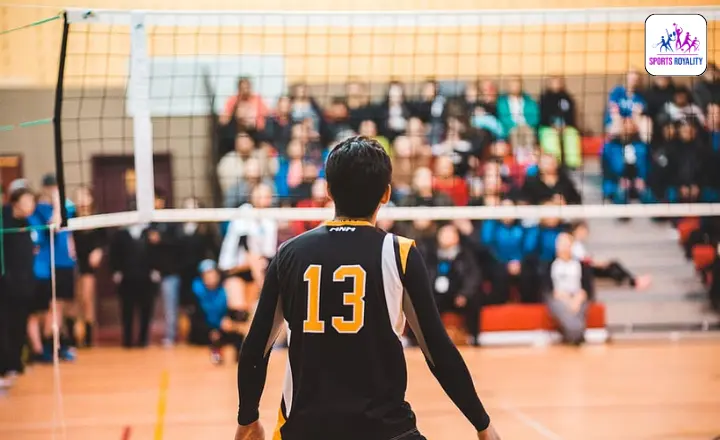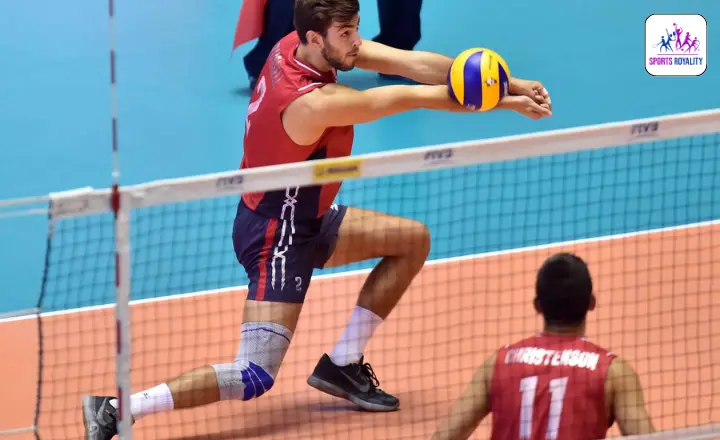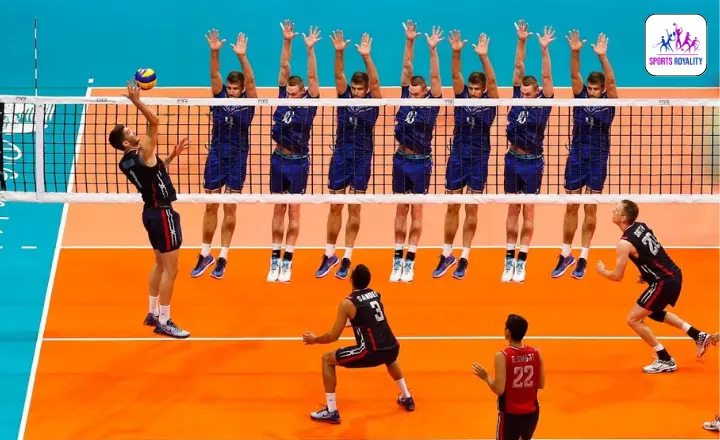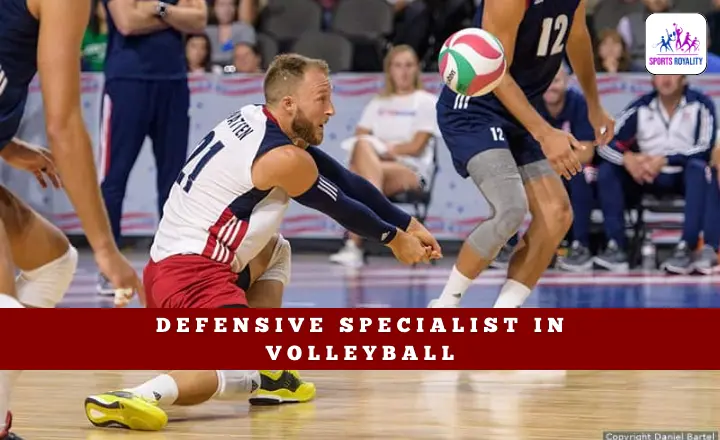The defensive specialist in volleyball is a lesser-known position that often needs to be noticed. While one of the five primary positions in volleyball, the DS plays an essential role in any team’s success.
It may be rare to see someone stepping into this specialized role, but their impact on the game can be nothing short of extraordinary when they do. This article will explore what is ds in volleyball and why their contribution should always be considered.
What Is A Defensive Specialist? What Do They Do?
A defensive specialist in volleyball is an essential position on any team. These players possess exceptional passing and digging abilities, making them crucial in preventing the opposition from scoring points. They are quick on their feet, ready to dive for a ball or stretch their arms out for a dig.
Defensive specialists are the backbone of the team’s defence, playing a vital role in covering for other players’ mistakes and maintaining control over long rallies.

Their focus is primarily on receiving serves and keeping the ball in play during attacking plays by the opposing team. Their incredible agility allows them to anticipate where the ball will go next, enabling them to react swiftly with precise movements.
In addition to being skilled at passing and digging, defensive specialists have excellent court awareness. They understand how different angles affect the ball’s trajectory, which helps them position themselves strategically to make accurate plays.
These athletes should also be capable communicators with exceptional decision-making abilities, as they are often placed at critical moments during a game when they need to make split-second choices regarding whether to pass or set up an offensive play.
DS Vs Libero… What’s The Difference?
Both positions involve playing in the back row and focusing on defensive skills, but subtle differences separate them. The libero is an actual designated position in volleyball, introduced to enhance defensive abilities while creating more offensive opportunities.
This player wears a different colored jersey and has certain privileges, like replacing any back-row player without being counted as a substitution.
The DS is not necessarily a specific position but rather a role that can be assigned to various players on the team. DS players are substituted into the game for front-row attackers or setters when they rotate to the back row.
How Important Is a Defensive Specialist In Volleyball?
A highly skilled DS can tremendously influence tightly contested game situations.
A Good DS Can Save A Match
Every team sport has moments when an individual player can turn the tide of a match. In volleyball, that player is often the defensive specialist (DS). They may not always get the glory like the big hitters on offence, but their impact on the game cannot be overlooked.
Imagine being down 21-22 in a crucial set, and your team’s passing has been struggling all match. The opposing server targets your weakest passer, making critical errors under pressure. This is where a good DS can step up and save the day.
A skilled DS knows how to handle pressure and rise above the challenge. Instead of crumbling under repeated attacks, they remain focused and stay calm. Their ability to read and anticipate serves becomes crucial at this point. By positioning themselves wisely, they can minimize passing errors and keep their team in the game.
What Makes A Good DS In Volleyball?
When considering our bomb squad analogy, the first thing that comes to mind is how effectively one handles stressful situations.
Keeps Their Cool Under Pressure
When the pressure is on and the game hangs in the balance, some players crumble while others thrive. This ability is particularly crucial in volleyball for a DS (defensive specialist) who enters the game not when the score is 5-5 in the first set but when it’s late in a nail-bitingly close set.

The pressure of being thrust into such high-stakes situations can be overwhelming for even the most experienced volleyball players. But those DSs who excel can block out self-doubt or anxiety and focus solely on executing their role to perfection.
Instead of succumbing to nerves, they embrace the challenge, knowing that their performance in these clutch moments can tremendously impact the game’s outcome.
Back Row Hitting Ability Is A Bonus
A defensive specialist (DS) capable of hitting from the back row can bring extra versatility to the team. In their primary role as defenders, these players can contribute offensively. This makes them more unpredictable and harder for opponents to defend against, as they must account for both strong spikes and accurate digs.
A DS with back-row hitting ability becomes an all-around threat on the court. They not only excel at preventing their opponents’ attacks but also hold the potential to deliver powerful hits that could score points for their team. This dual capability pressures opposing teams, forcing them to adjust their defenses accordingly.
Is Defensive Specialist A Good Position?
With great responsibility comes great reward. DS players are often crucial in turning the tide of a game by making incredible digs and keeping plays alive when all seems lost.

One unique aspect of being a DS is the pressure of making crucial passes during high-pressure situations. Imagine being subbed in when your team is down 24-25, and one shanked pass could cost you the game. This pressure, though intimidating, pushes DS players to hone their skills and perform at their best under extreme circumstances.
Playing as a DS limits an athlete’s opportunities to contribute offensively. While it’s true that DS players have fewer attacking chances than other positions, their main focus is on defence and passing accuracy, which can be equally as crucial in securing victory for their team.
Volleyball Setter Hand Signals
Volleyball setter hand signals are a crucial element of effective communication on the court. These subtle yet powerful gestures allow setters to coordinate plays and direct their teammates precisely and efficiently.
With clear, concise hand signals, setters can convey valuable information to their hitters without alerting the opposing team, giving them a strategic advantage in each play.
One innovative approach to volleyball setter hand signals is using personalized codes or symbols unique to each team. These allow for greater customization and flexibility in communicating plays, minimizing the risk of misinterpretation by opponents.
Incorporating non-verbal cues such as facial expressions or body language can further enhance the effectiveness of these signals, adding another layer of subtlety and complexity to the game.
Mastering volleyball setter hand signals requires technical proficiency, keen situational awareness, and adaptability. Setters who can seamlessly integrate these non-verbal cues into their overall strategy have the potential to elevate their team’s performance and outmanoeuvre their adversaries on the court.
The artistry behind these silent directives showcases the intricate dynamics at play in competitive volleyball, highlighting the crucial role of communication in achieving success.
Conclusion
Being a defensive specialist in volleyball requires unique skills and a strong dedication to the game. These players are vital to the success of any team, as they provide solid defensive support and dig up the opponent’s attacks.
Their ability to read the game, anticipate plays, and make quick decisions is what sets them apart from other positions on the court. With their relentless pursuit of every ball, defensive specialists bring energy and determination to their team.
FAQ’s
What’s the average size/height of a defensive specialist?
Defensive specialists are often shorter in height compared to other positions. They typically range from around 5’9 to 6’1. This is because their role primarily involves quickness, agility, and the ability to stay low and move laterally to guard opponents effectively.
What strategies do defensive specialists use during matches?
Defensive specialists employ strategies such as reading the hitter’s body language to anticipate shots, focusing on vulnerable areas of the court, communicating effectively with teammates for better coverage, and adjusting positioning based on the opponent’s tendencies.

